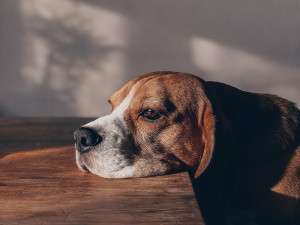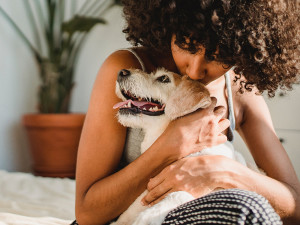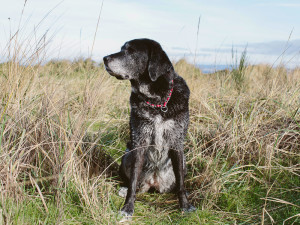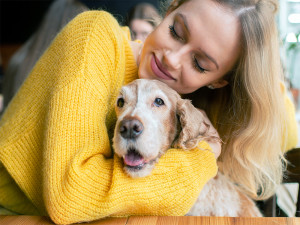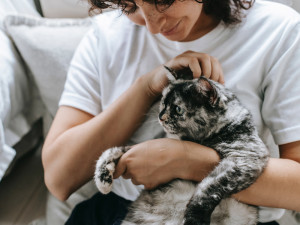Should Your Dog Be There When Your Other Dog Is Put to Sleep?
Three dog behaviourists share insights and advice to help you and your pups navigate this incredibly difficult time
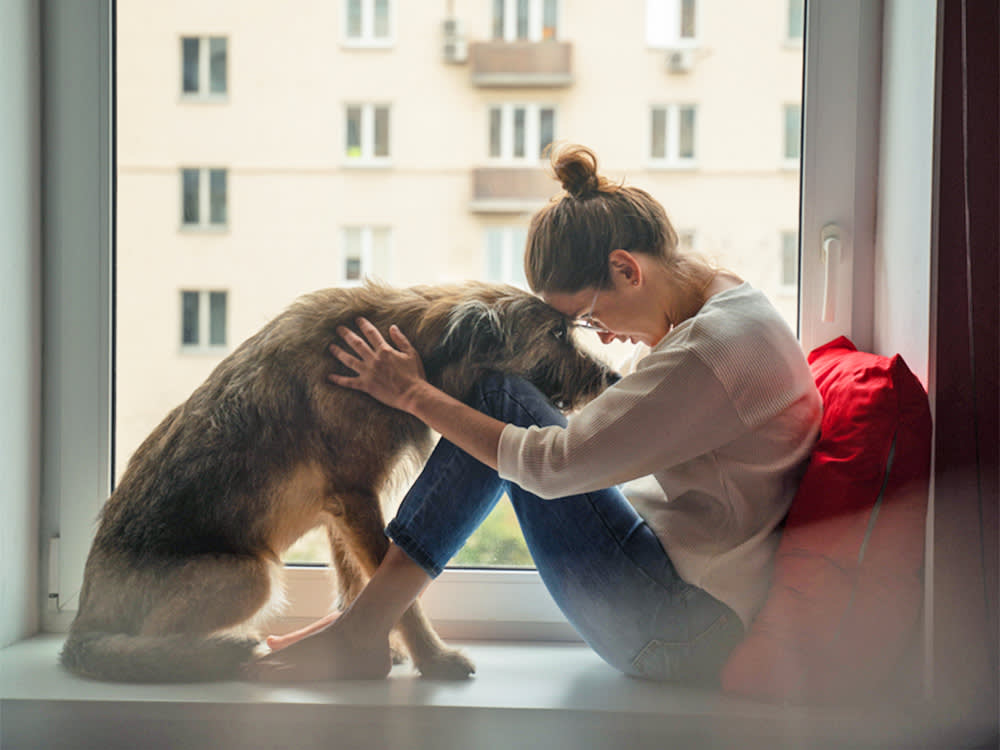
Share Article
Trigger warning: this article discusses grief and loss in depth.
Deciding to euthanise your elderly or poorly dog isn’t just completely heartbreaking; it’s also incredibly stressful. At a time when you’re preparing to grieve your beloved petopens in new tab, you’re also faced with a raft of decisions. Should your dog be put to sleep at home or at the vet’s? What time of day would be best? And if you have another dog or dogs, should they be present when the procedure takes place?

Get (totally free) deals for food, treats, accessories, tech and way more pet parenting must-haves.
This last question ultimately depends on personal choice because, like humans, dogs respond to death in different and hard-to-predict ways. According to dog behaviourist, trainer and author Louise Glazebrookopens in new tab, the main objective behind having your other dog(s) present is to prevent a situation where it seems as though the departing dog “walks out of the home and never returns.” She adds: “This can be deeply traumatising for the dog(s) left behind and they can spend weeks looking for them and waiting for them to return.”
However, this doesn't mean it’s always advisable for your surviving dog(s) to be present when their companion is put to sleep. Here, with insights from three leading dog behaviourists, are all the questions to ask yourself before you make your final decision.
Consider the bond your dogs have
This is definitely something to factor into your decision, but like everything to do with death and grieving, it’s not an exact science. Dog trainer Niki French, founder of Pup Talkopens in new tab, says that “the closer the bond between the dogs, the more likely it is that the surviving dog may be affected by the loss, but this isn’t always the case.”
You should consider the specific dynamic between the dogs as well as the depth of their connection. Louise believes that if the surviving dog “looks to the ill or elderly dog for direction” in life, then they should “definitely” be present when their friend is put to sleep.
Does it depend on where the euthanasia is taking place?
Again, this is an important contributing factor because some dogs are stressed by any trip to the vet, so seeing their companion pass away there could prove incredibly distressing. “If the surviving dog is scared of the vets it probably won’t be able to pay as much attention to what is happening anyway,” says clinical animal behaviourist Emily Birchopens in new tab.
Even if your elderly or poorly dog is being put to sleep at home, you should think carefully about whether to have your other dog(s) in the room when the actual procedure takes place. “It’s of the utmost importance to ensure the least amount of stress is caused to all dogs in the home,” says Niki. Above all, she recommends that you “discuss your wishes and what’s practical with your vet” ahead of the euthanasia and “factor in how you think you’re likely to cope on the day.”
Should your surviving dog see their companion after they’ve passed away?
Emily says “a nice amount of anecdotal evidence” suggests that this moment of peace and stillness with the departing dog can be beneficial. In particular, it can help the surviving dog(s) to understand that their friend isn’t coming back. She says she has done this with her dogs who’ve passed away previously. “Once my dog has been euthanised, I’ll let my other dogs in one by one, so they can sniff and be around them,” she says. “That way, I’ve found that they’ve never looked for the dog who’s died, even if they did used to look for that dog when they were away at the vet or for some other reason.”
If you do decide to let a surviving dog see the late dog’s body, Niki says it’s imperative “to let your dog guide you” in this incredibly delicate situation. “They may want to spend some time with the body, or they may not seem very interested,” she adds. Louise points out that it’s important to lead a surviving dog to the late dog’s body in “a really calm way” so as to minimise any potential distress.
What aftercare should you give your surviving dog?
Humans deal with grief in different ways and at varying speeds, and so do our dogs. “They’re complex emotional beings, and losing a loved one that they’re bonded with can really impact them,” says Louise. “All we can do is try to offer opportunities to play, interact, go on quiet walks and be close to you.”
Niki recommends setting aside a little more time than usual for your surviving dog so you can help them navigate this difficult time. “I’d say this is especially important if they’re becoming an only dog for the first time,” she adds.
Niki also says she knows dogs “who have become really ill following the death of the other dog.” If you’re at all worried about their mental or physical health, go to the vet’s immediately. She also points out that there is no ‘correct’ or ‘expected’ way for a dog to grieve. “Try not to be upset or offended if your surviving dog seems not to care,” she says. “I know this can seem harder in some ways than if they’re clearly grieving, but it’s also a perfectly normal response.”
Above all, keep a close eye on your dog’s behaviour and adjust your own accordingly. ”They may lose their appetite and want more, or less, contact with you,” says Emily. “They may keep checking the usual sleeping spots for the departed dog. They may whine and whimper more than usual. You may notice other changes in their behaviour, so consider talking to an accredited dog trainer or behaviourist if you need some help.”
And remember not to be too hard on yourself. You’re grieving, too, and the very best thing you can do for your surviving dog(s) is to take good care of your own mental health.

Nick Levine
Nick Levine is a freelance writer and editor based in south London. If you ever need a cat or dog-sitter, he is ready, willing, able and battle-hardened.
Related articles
![a nervous dog sits on a sofa]()
Bringing Home A Very Nervous Rescue Dog – A Guide For Anxious Parents
At so many points in those first hours, weeks, months, I screamed, internally: what have we done?
![Portrait Of Large, Senior, Mixed Breed Dog On Beach]()
10 Tips for Grieving a Pet
We asked five grief experts how to cope with feelings of guilt after we lose a pet
![Young caucasian cheerful blonde girl sitting and hugging her lovely cocker spaniel dog in cafe.]()
10 Longevity Tips From People Whose Pets Have Lived Incredibly Long Lives
Follow these vet-backed tips to help your furry friend live a healthy and full life
![Pet owner comforts cat]()
How Vets Figure Out What’s Going on With Your Pet
Relying on more than just tests, here’s what vets do to help their patients
